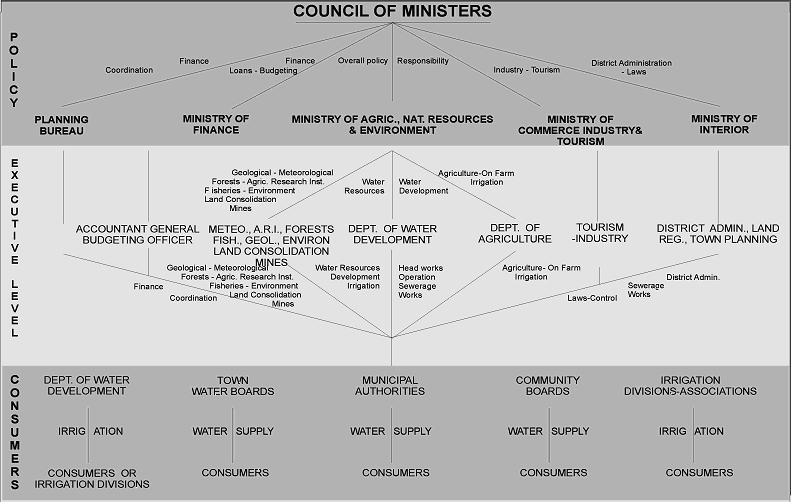At the policy level, the water administration rests with the Council of Ministers that is formed jointly by four Ministries: Agriculture, Finance, Interior and Commerce. At the executive level, powers are divided between two ministries, the Ministry of Agriculture, Natural Resources and Environment (MANR&E) and the Ministry of Interior. The former has technical responsibility for water resources policy, assessment and monitoring, but also for development of water resources and the bulk sale of water to end-users. The latter is responsible for the enforcement of water-related laws, including the issue of groundwater permits. Its representatives act as the chairmen of Municipal Water Boards, Village Water Commissions and local irrigation associations, known as Irrigation Divisions.

Organisational Chart for Water Resources Management
The Water Development Department (WDD), which is one of the departments of the Ministry of Agriculture National Resources and Environment (MANR&E), is responsible for implementing the water policy of the Ministry, with the overall objective of pursuing the rational development and management of water resources.
At the regional level, the District Administration under the Ministry of Interior plays a key role in the implementation and enforcement of water-related laws, including the issue of groundwater permits. All municipal water supplies and non-government irrigation schemes are in principle under the jurisdiction of the Ministry of Interior. Other governmental departments are also involved at various aspects of the water industry of the island.
Responsibility for water administration at the local level is in the hands of the Municipal Water Boards and Village Commissions for domestic water supply, the Irrigation Divisions, Irrigation Associations, Waterworks Committees and WDD for irrigation, and the Sewerage Boards for wastewater collection and treatment. All these organizations, except WDD are under the jurisdiction of the Ministry of Interior.
At the user level, farmers have the right to form Irrigation Divisions and Associations to construct and manage irrigation schemes. Villages also have the right to establish their own Commissions for developing local resources for domestic water supply.